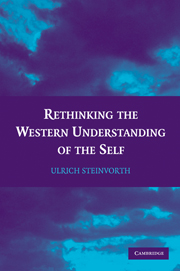Book contents
- Frontmatter
- Contents
- Preface
- Part I Introduction
- Part II Basics of Philosophical Psychology
- Part III The Cartesian Self in History
- Part IV Value Spheres
- Chapter 10 A First Diagnosis and Therapy for Modernity
- Chapter 11 Value Spheres Defined and the State
- Chapter 12 The Serving Spheres
- Chapter 13 Technology
- Chapter 14 Utilitarian or Cartesian Approach
- Chapter 15 The Media and the Professions
- Chapter 16 Science
- Chapter 17 Art and Religion
- Chapter 18 Sport
- Chapter 19 Latin and Absolute Love
- Part V A Self-Understanding Not Only for the West
- Select Bibliography
- Index
Chapter 14 - Utilitarian or Cartesian Approach
Published online by Cambridge University Press: 05 June 2012
- Frontmatter
- Contents
- Preface
- Part I Introduction
- Part II Basics of Philosophical Psychology
- Part III The Cartesian Self in History
- Part IV Value Spheres
- Chapter 10 A First Diagnosis and Therapy for Modernity
- Chapter 11 Value Spheres Defined and the State
- Chapter 12 The Serving Spheres
- Chapter 13 Technology
- Chapter 14 Utilitarian or Cartesian Approach
- Chapter 15 The Media and the Professions
- Chapter 16 Science
- Chapter 17 Art and Religion
- Chapter 18 Sport
- Chapter 19 Latin and Absolute Love
- Part V A Self-Understanding Not Only for the West
- Select Bibliography
- Index
Summary
The first point is a fundamental objection to the preceding discussion. I appeal to the self and capabilities, as a criterion for distinguishing legitimate from illegitimate genetic engineering and as a gift we are entitled to use and improve. But isn't it obvious that utility is a superior criterion and grounds for the value of gene technology? Isn't utilitarianism a more adequate foundation for biotechnology? Isn't it more convincing because it is less metaphysical? When we talk of our capabilities as a gift we are to live up to and therefore entitled to use, perhaps even obliged to perfect, we imply metaphysical ideas. By contrast, the utility criterion legitimates all and only biotech that maximizes happiness. If this implies metaphysics as well, at least it seems to be a generally accepted one.
We are here again confronted with the competition of the utilitarian and the Cartesian approaches. But now it seems clear that we do and ought to use technology for making our life as comfortable as possible. Isn't this the best proof we may imagine for showing that we use our capabilities in order to be happy rather than for the sake of perfecting them and our activities? So here the utilitarian approach proves its soberness and its unpretentious metaphysics, if we have to call its belief in the finality of happiness metaphysics at all. The Cartesian approach, by contrast, seems caught in the implausibility of its presuppositions and consequences.
- Type
- Chapter
- Information
- Rethinking the Western Understanding of the Self , pp. 127 - 133Publisher: Cambridge University PressPrint publication year: 2009

